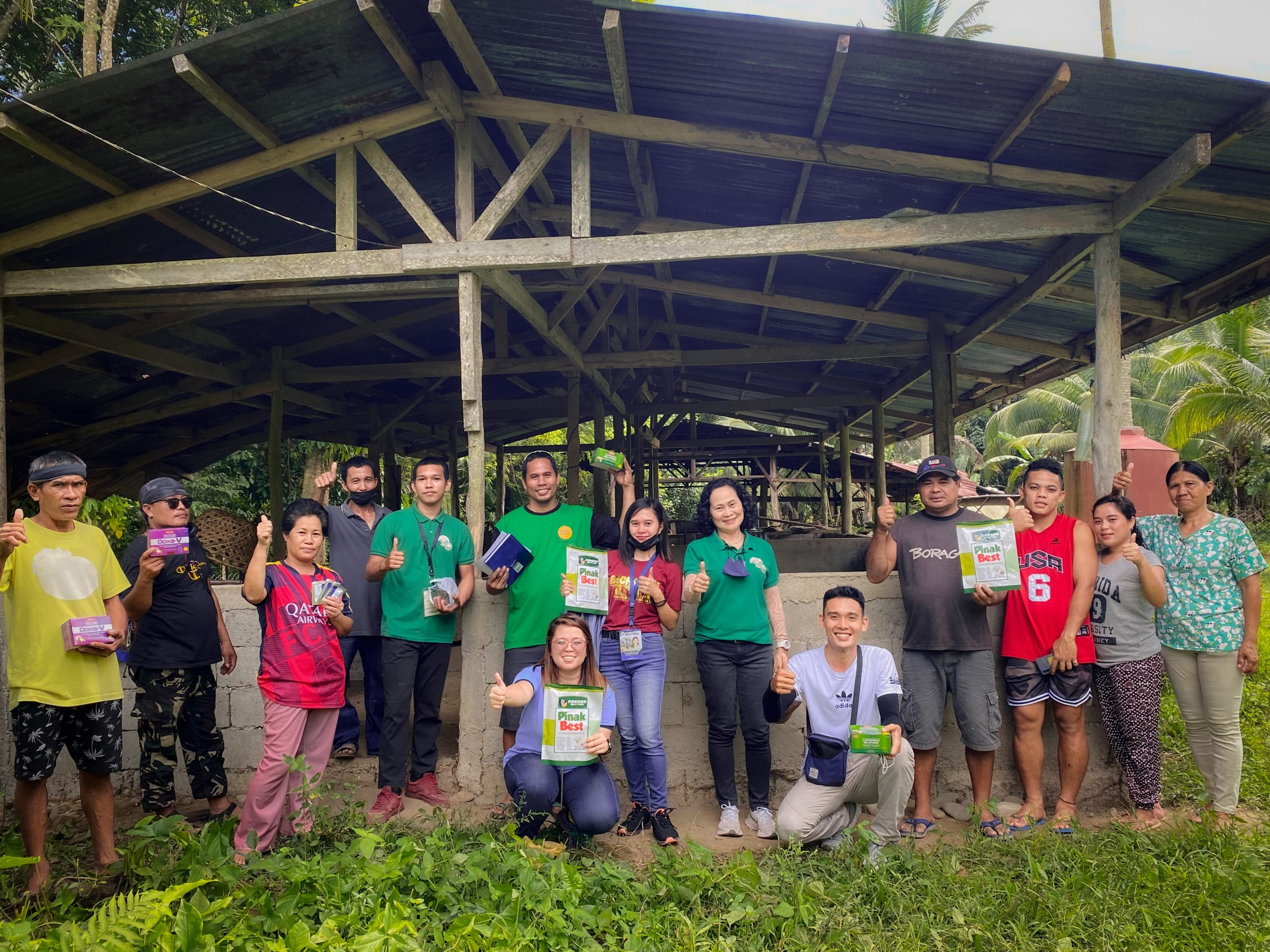DAVAO DE ORO, July 19, 2022 – Strengthening balut production in the province, 200 members from 10 farmers’ associations (FAs) across 10 municipalities of Davao de Oro received mallard ducks from the Department of Agriculture – Special Area for Agricultural Development (DA-SAAD) as part of the program’s 2022 livelihood projects.
Mallard duck raising was identified as a feasible livelihood project for Geographically Isolated and Disadvantaged Areas (GIDAs) and End Local Communist Armed Conflict (ELCAC) farmers because of its adaptability to changing weather conditions and quick turnover. SAAD sees the needs of communities living in GIDAs and conflict-stricken areas of ELCAC for food and income resources, as access to basic services are usually scarce in these areas.
Each FA received 300 birds, 260 of which are ready-to-lay (RTL) duck hens, the remaining, drakes. Alongside the poultry, the program supplemented the FAs with 55 sacks of feeds (layer pellets in 2 tranches), various biologics (multivitamins, dewormer, antibiotics), 30 pieces of waterer, 150 pieces of egg trays (both to be delivered by the end of August), and incubator with hatcher at the end of the third quarter. In its entirety, the project cost Php 3,095,460.
Addressing Rizal Tribal Farmers Association, an indigenous people (IP)-centric FA assisted by the local Revitalized Pulis sa Barangay in Monkayo, SAAD Regional Focal Naomi C. Lamata said, “Tumong ug tinguha sa SAAD tung una pa nga madugangan ang panginabuhian sa mga mag-uuma sa hilagyong dapit. Ang naka-special ani, Davao de Oro ra sa entero Davao Region naay SAAD. Ang isa pa, ginahatod sa inyohang lugar, dili kamo muadto sa munisipyo.”
(SAAD has always been about supplementing our farmers’ income streams in hinterland areas. What’s special about this is that in the entire Davao Region, only the province of Davao de Oro has SAAD. We deliver in your areas; you are not required to come to the municipality’s center).
In conjunction with the mallard duck production project, all 10 FAs will also receive Open-Pollinated Variety (OPV) corn seeds as complement crop-based intervention to the poultry.
“Sa part sa amoang asosasyon, bulahan kaayo mi kay naa sa amoa padulong ang mga proyekto. Mapasalamaton kami kay nahatagan jud ug na-train mi para ani. Andam mi nga palungtaron jud ni,” Jumie Cuevas, Chairperson for Rizal Tribal Farmers Association, said.
(We are fortunate because these projects are coming to us. Thankful that we were trained and given these, and we are prepared to sustain this).
Prior to distribution, SAAD capacitated all identified FAs with basic livestock, poultry, and various crop management practices to ensure the projects’ sustainability. The training also equipped farmers with practical and technical know-how specific to the projects.
Distribution
Newly-elected mayors of Monkayo and Maragusan, Emmanuel “Way Kurat” Zamora and Lito Cabalquinto, respectively, attended the distributions to their concerned FAs.
“Ang pag-uma mao ang atoang naandan. Ang paguma, diha ko nakabangon tung una. Isa ka lata sa kalabasa, ako nagugmad, ako nagtanom, akoy atiman. Importante ni sa atoa, ug kita nalipay nga ang ilang gi-saad ila ra dyud gihatag,” Cabalquinto enthused.
(Farming is what we are used to here. It’s what saved me. One can of squash (seeds), I tilled, I planted, and I cared for (it). This is important to us, and we are glad that what they promised, they delivered).
Tandik Multipurpose Cooperative, a local FA serving the isolated community of Tandik in Maragusan, is one of seven identified FAs slated to receive SAAD’s 2022 interventions. Tandik, more than an hour and a half away from the municipality proper, has an estimated elevation above sea level of 916 meters.
Chairperson Jupiter Comania, accepting the interventions, said, “Amoa jud ni gihimoan ug polisiya, kay para mulungtad. Naay obligasyon kami nga mga mudawat para kung mubalik ang SAAD, naa tay mapakita.”
(We made a policy for this for it be sustainable. The farmers have an obligation so that when SAAD comes back, we have something to show).
The FA’s policy is basically a roadmap for all members to have their share of mallard ducks in six months’ time. The first step is a communal pen set up by the river, with plans to simultaneously sell and hatch eggs for income and distribution.
For Rizal Tribal Farmers Association, one of the recipient associations, their income from collected eggs will all be going into the association’s finances. Consisting of all Manobo IPs, the local R-PSB was pivotal in the organization and registration of the FA. With the armed forces’ help, the members agreed to forego initial labor fees for rearing the birds.
“Ang pagbahog sa asosasyon lang sa kay para way mugawas nga gasto. Kung kaya na, diha na mi manguha ug tigbantay,” Cuevas added.
(The feeding will be done by association members to prevent extra expenses. When we are able, that’s the time we’ll get labor).
Amid the avian flu outbreak, the program was able to deliver and distribute the birds as the project’s supplier is local. As per the agency’s memo, the movement of birds within a region is allowed. ###
Writer: James Brian R. Flaga, DA-SAAD Region 11 Information Officer
Source: DA-SAAD Davao de Oro





Comments (0)